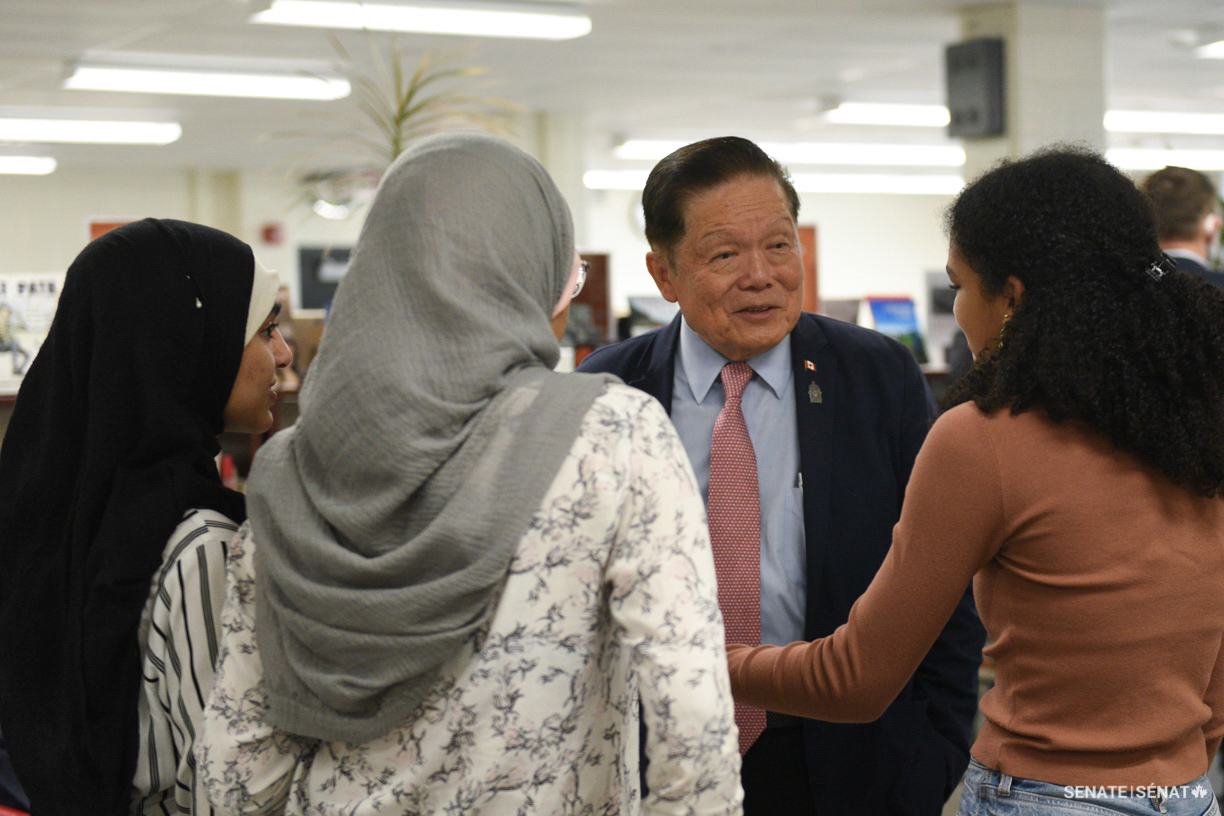Anti-Muslim Hate: Senators meet with Muslim communities as attacks rise

Troubled by an alarming increase of hate crimes and targeted attacks against Muslims in recent years, the Senate Committee on Human Rights undertook a fact-finding mission to four provinces in September to hear from affected communities for its study on Islamophobia in Canada.
Senators held day-long public hearings in Vancouver, Edmonton, Mississauga and Québec City, where they heard impassioned and compelling testimony from a range of community leaders, stakeholders, academics and survivors of anti-Muslim discrimination and violence.
“It was vital to the study to hold public hearings, on the ground, in communities affected by anti-Muslim racism,” said committee chair Senator Salma Ataullahjan.
“The hearings allowed senators to hear a variety of lived experiences from Canadian Muslims, witness first-hand the impact of Islamophobia on Canadian Muslims and observe how communities and organizations are working tirelessly to address Islamophobia.”
According to Statistics Canada, the number of police-reported hate crimes targeting Muslim religions in 2021 increased 71% from the previous year. And from 2016 to 2021, Canada witnessed the highest number of Muslims killed in targeted, hate-motivated attacks of all the G7 countries, according to the National Council of Canadian Muslims.
The Senate committee’s study is examining the sources of Islamophobia in Canada and its impact on individuals, as well as incidents of discrimination, physical violence and online hate against Muslims. The committee’s goals are to better understand the scope of the problem across the country and identify what concrete action should be taken by Parliament and other authorities.
Some key themes and issues witnesses raised during the committee’s hearings and fact-finding visits to local mosques included: the underreporting of hate-motivated threats and violence; the relationship between Muslim communities and the police; the challenges of regulating online hate; and greater investments in anti-racism education and bystander training to create safe schools and communities.
Testimony from across the country called attention to the intersection of gender, race and religion in Islamophobia, including the more frequent intimidation and targeting of visibly Muslim women and Black Muslims. Some questioned whether “Islamophobia” remains an adequate term to describe this discrimination.
“It’s not a phobia. That fear is translated to action, to physical aggression, to unemployment, to not being promoted, to being kicked out and screened,” said Dr. Neila Miled, anti-racism advisor at the University of British Columbia’s faculty of medicine.
“This is anti-Muslim racism. It intersects with race because we are a racialized community.”
In Quebec, senators also heard testimony about how that province’s Bill 21 is affecting women who wear hijabs and Muslim communities at large, for whom the memory of the deadly mass shooting at the Islamic Cultural Centre of Québec City in 2017 is still raw.
“As leaders, we are quick to condemn Islamophobia in the aftermath of violent tragedies, but we have been slow to act to protect Muslim communities,” said Senator Amina Gerba, member of the committee.
“We cannot afford to wait any longer.”
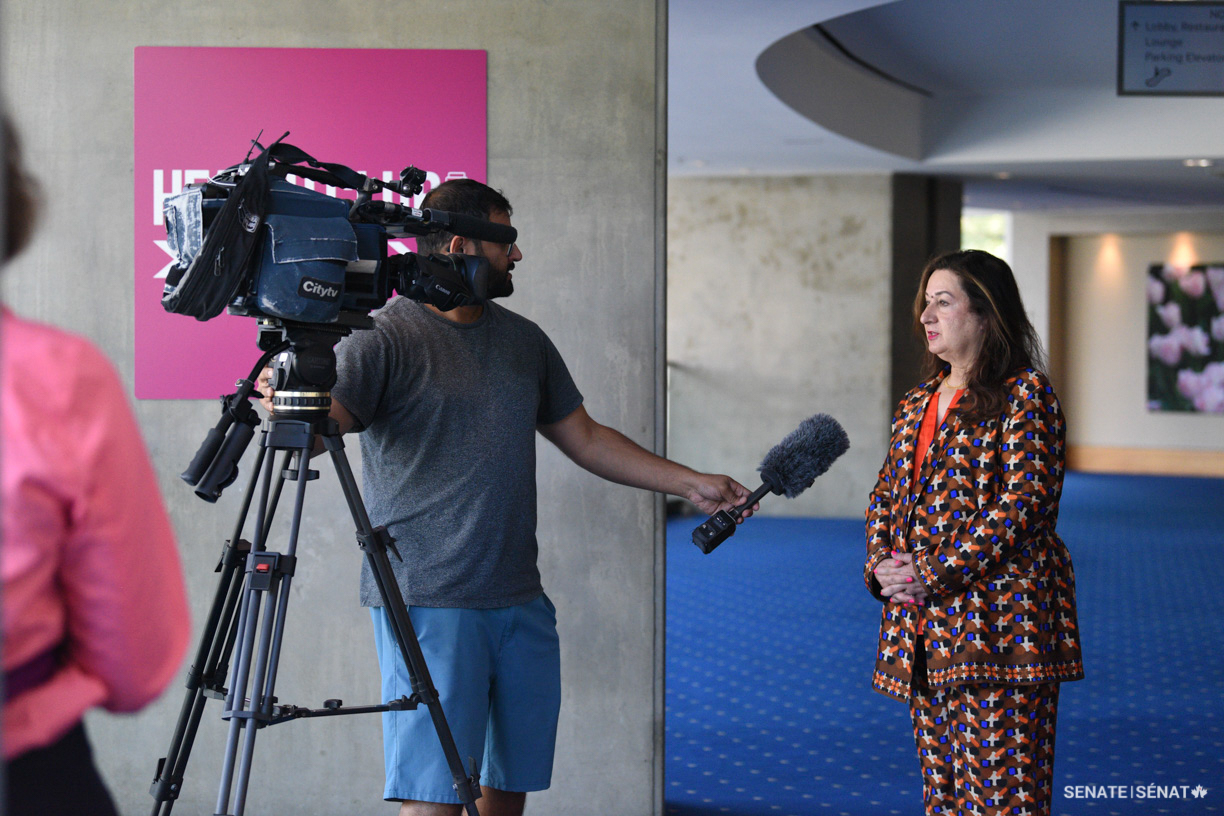
Senator Salma Ataullahjan, chair of the Senate Committee on Human Rights, speaks to a journalist about the committee’s study on Islamophobia in Vancouver on Wednesday, September 7, 2022.
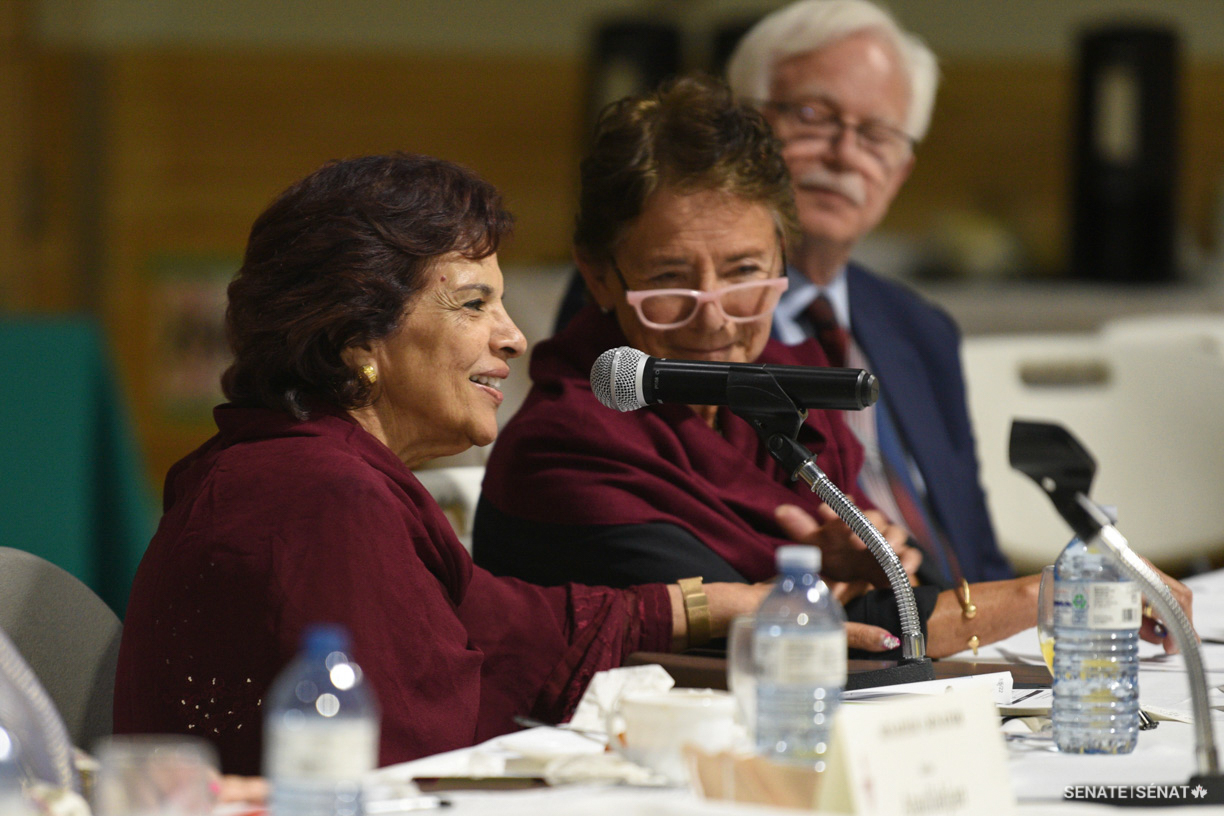
From left, senators Mobina S. B. Jaffer, Bev Busson and David M. Arnot address congregants during the committee’s fact-finding visit to the Masjid Al-Salaam and Education Centre in Burnaby, British Columbia, on Tuesday, September 6, 2022.
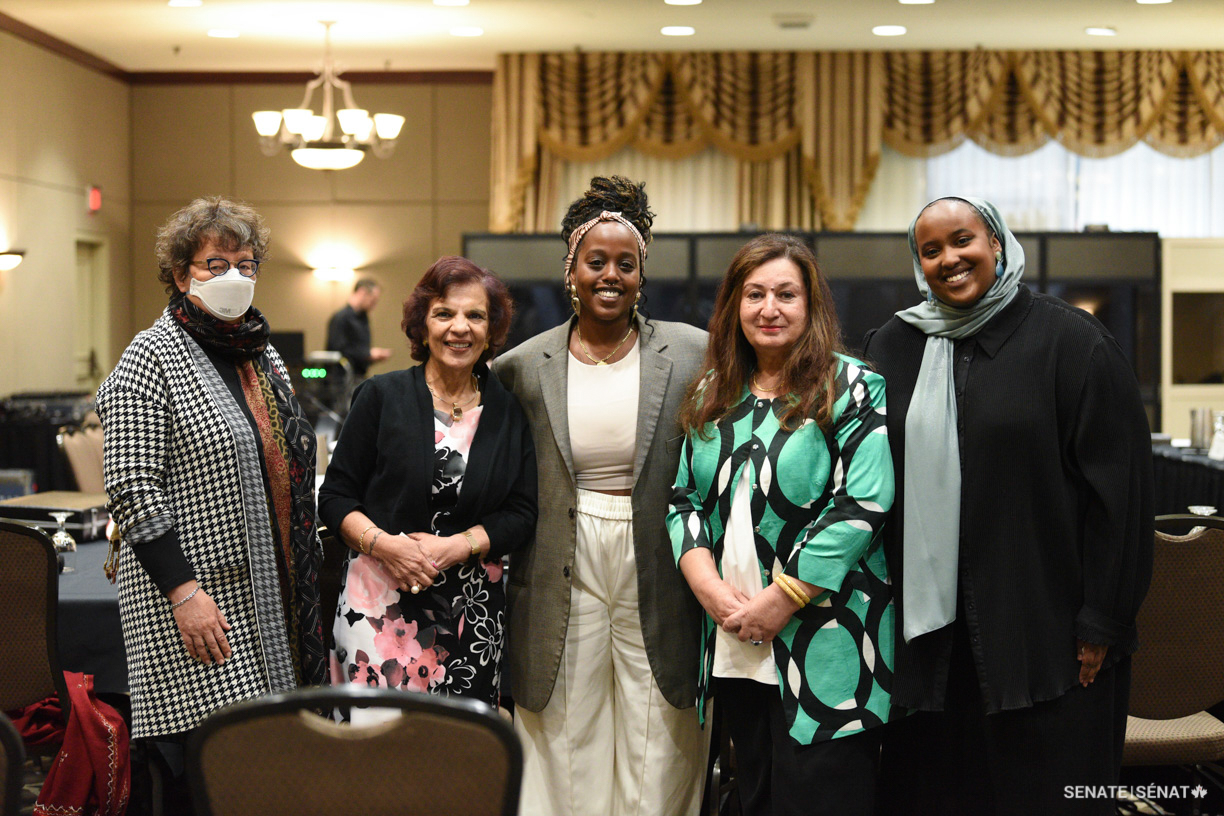
Black Art Matters Director, poet and queer activist Nasra Adem, centre, and poet Timiro Mohamed, right, pose for a picture with, from left, senators Paula Simons, Mobina S. B. Jaffer and Salma Ataullahjan at a public hearing in downtown Edmonton on Thursday, September 8, 2022.
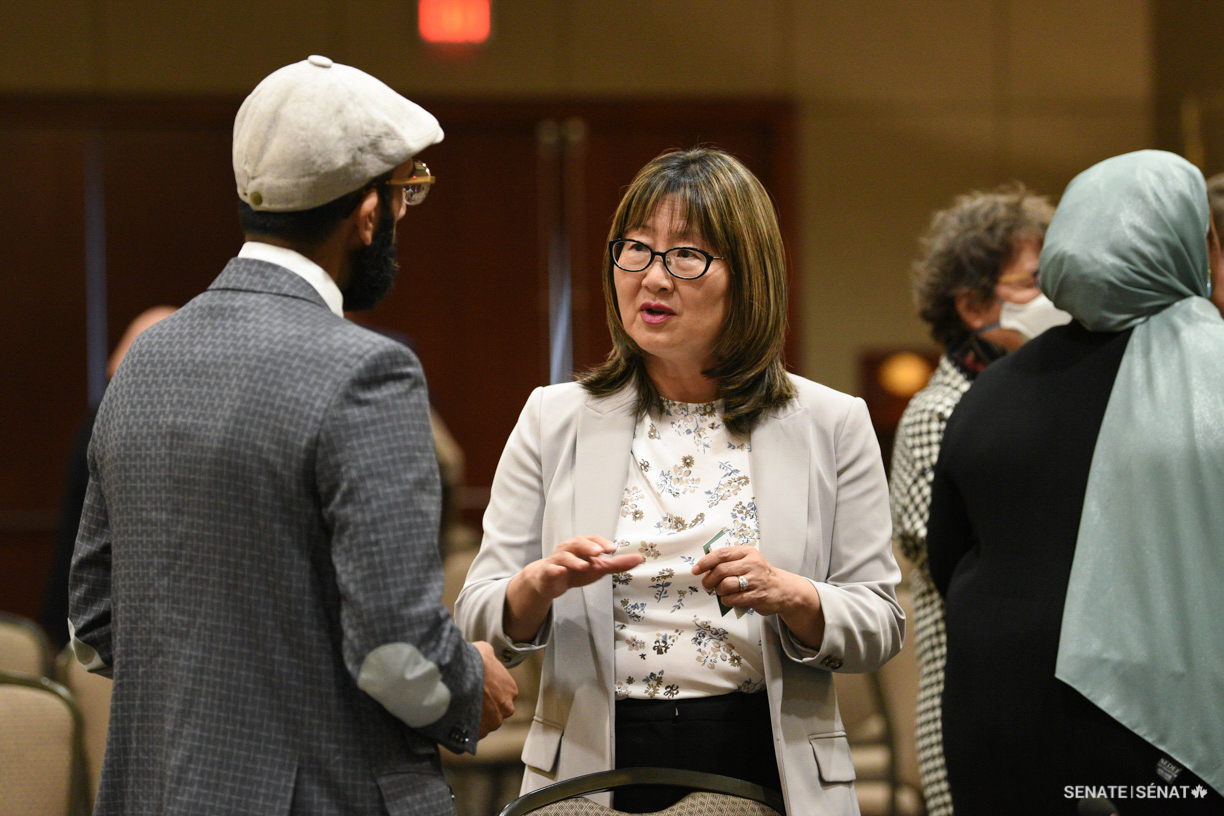
Senator Yonah Martin speaks with Omar Yaqub of the Islamic Family & Social Services Association following public hearings in Edmonton.
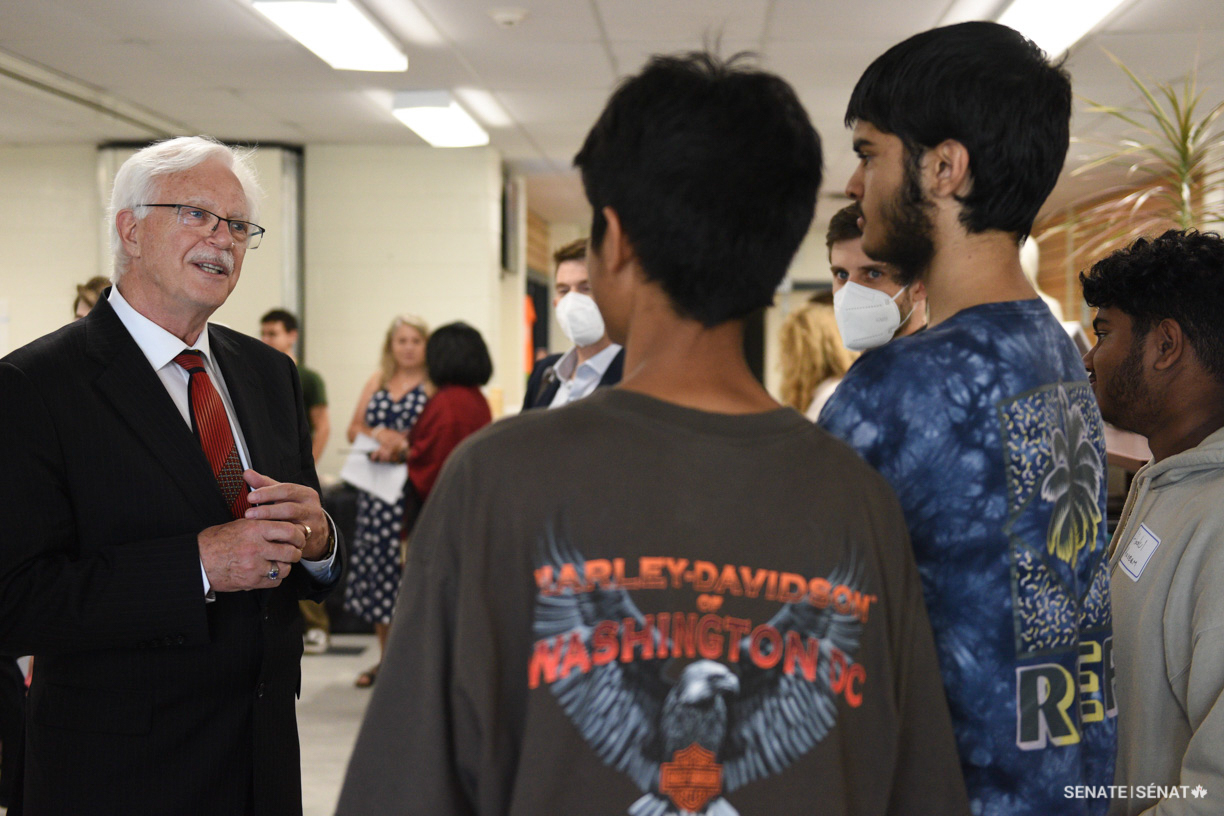
Senator David M. Arnot speaks with students during a visit to Clarkson Secondary School in Mississauga.
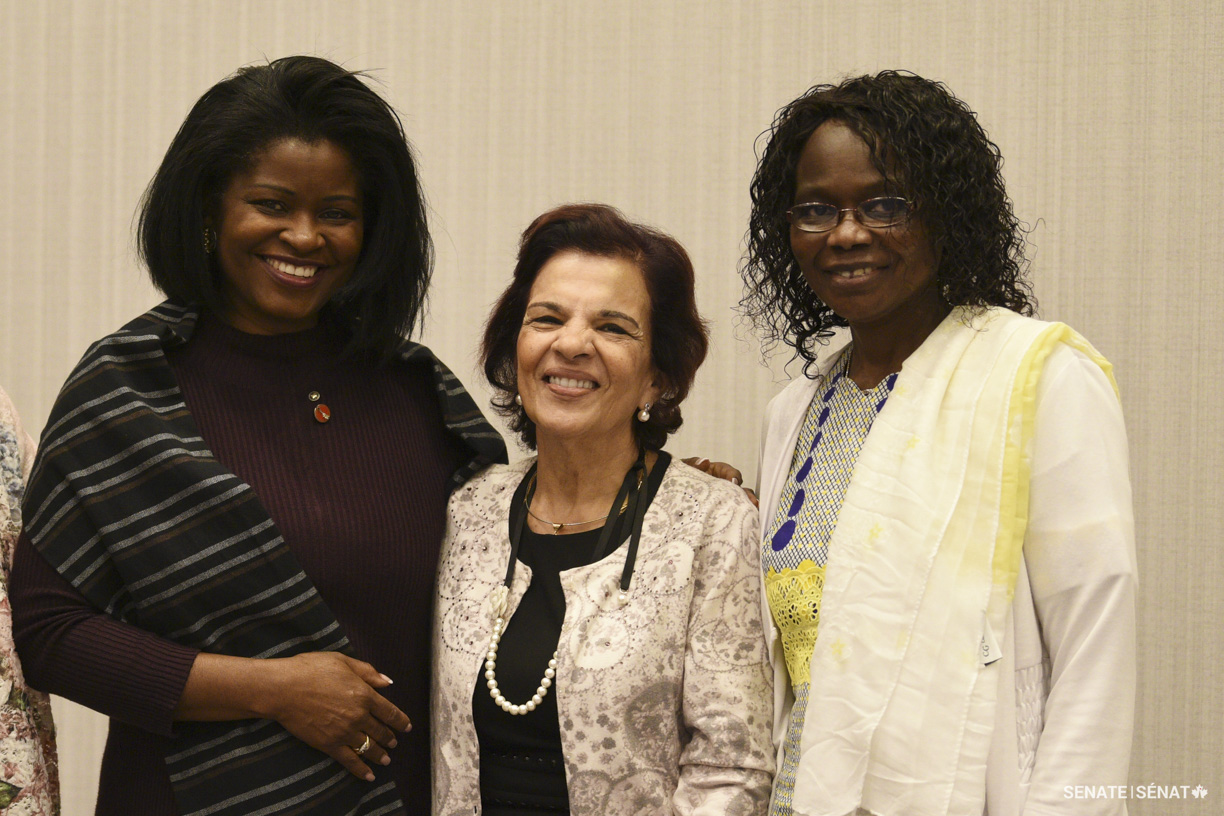
From left, senators Amina Gerba and Mobina S. B. Jaffer connect with Thérèse Sagna, board member of the Quebec Women’s Federation. Ms. Sagna testified before the human rights committee on Tuesday, September 20, 2022, during public hearings in Québec City.
Related articles
Tags
Committee news
Anti-Muslim Hate: Senators meet with Muslim communities as attacks rise

Troubled by an alarming increase of hate crimes and targeted attacks against Muslims in recent years, the Senate Committee on Human Rights undertook a fact-finding mission to four provinces in September to hear from affected communities for its study on Islamophobia in Canada.
Senators held day-long public hearings in Vancouver, Edmonton, Mississauga and Québec City, where they heard impassioned and compelling testimony from a range of community leaders, stakeholders, academics and survivors of anti-Muslim discrimination and violence.
“It was vital to the study to hold public hearings, on the ground, in communities affected by anti-Muslim racism,” said committee chair Senator Salma Ataullahjan.
“The hearings allowed senators to hear a variety of lived experiences from Canadian Muslims, witness first-hand the impact of Islamophobia on Canadian Muslims and observe how communities and organizations are working tirelessly to address Islamophobia.”
According to Statistics Canada, the number of police-reported hate crimes targeting Muslim religions in 2021 increased 71% from the previous year. And from 2016 to 2021, Canada witnessed the highest number of Muslims killed in targeted, hate-motivated attacks of all the G7 countries, according to the National Council of Canadian Muslims.
The Senate committee’s study is examining the sources of Islamophobia in Canada and its impact on individuals, as well as incidents of discrimination, physical violence and online hate against Muslims. The committee’s goals are to better understand the scope of the problem across the country and identify what concrete action should be taken by Parliament and other authorities.
Some key themes and issues witnesses raised during the committee’s hearings and fact-finding visits to local mosques included: the underreporting of hate-motivated threats and violence; the relationship between Muslim communities and the police; the challenges of regulating online hate; and greater investments in anti-racism education and bystander training to create safe schools and communities.
Testimony from across the country called attention to the intersection of gender, race and religion in Islamophobia, including the more frequent intimidation and targeting of visibly Muslim women and Black Muslims. Some questioned whether “Islamophobia” remains an adequate term to describe this discrimination.
“It’s not a phobia. That fear is translated to action, to physical aggression, to unemployment, to not being promoted, to being kicked out and screened,” said Dr. Neila Miled, anti-racism advisor at the University of British Columbia’s faculty of medicine.
“This is anti-Muslim racism. It intersects with race because we are a racialized community.”
In Quebec, senators also heard testimony about how that province’s Bill 21 is affecting women who wear hijabs and Muslim communities at large, for whom the memory of the deadly mass shooting at the Islamic Cultural Centre of Québec City in 2017 is still raw.
“As leaders, we are quick to condemn Islamophobia in the aftermath of violent tragedies, but we have been slow to act to protect Muslim communities,” said Senator Amina Gerba, member of the committee.
“We cannot afford to wait any longer.”

Senator Salma Ataullahjan, chair of the Senate Committee on Human Rights, speaks to a journalist about the committee’s study on Islamophobia in Vancouver on Wednesday, September 7, 2022.

From left, senators Mobina S. B. Jaffer, Bev Busson and David M. Arnot address congregants during the committee’s fact-finding visit to the Masjid Al-Salaam and Education Centre in Burnaby, British Columbia, on Tuesday, September 6, 2022.

Black Art Matters Director, poet and queer activist Nasra Adem, centre, and poet Timiro Mohamed, right, pose for a picture with, from left, senators Paula Simons, Mobina S. B. Jaffer and Salma Ataullahjan at a public hearing in downtown Edmonton on Thursday, September 8, 2022.

Senator Yonah Martin speaks with Omar Yaqub of the Islamic Family & Social Services Association following public hearings in Edmonton.

Senator David M. Arnot speaks with students during a visit to Clarkson Secondary School in Mississauga.

From left, senators Amina Gerba and Mobina S. B. Jaffer connect with Thérèse Sagna, board member of the Quebec Women’s Federation. Ms. Sagna testified before the human rights committee on Tuesday, September 20, 2022, during public hearings in Québec City.



